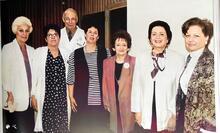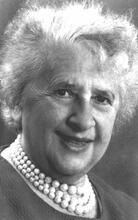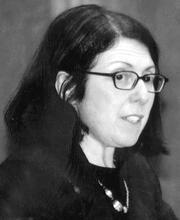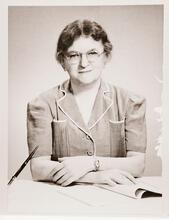Sophia Moses Robison
Sophia Moses Robison discovered her passion for social advocacy in college. After earning her PhD, she began her career at the Hebrew Sheltering Guardian Society. Active in the National Council of Jewish Women throughout her life, Robison also researched at Columbia University and studied the economic impact of arriving refugees after World War II for the federal government. Her explorations into youth delinquency demonstrated the class and social biases in the reporting of delinquency. Towards the end of her career she shifted towards teaching, and she spent the last decade of her professional life as a professor at the New York School of Social Work. She continued to research after her retirement, adding to her already-prolific collection of publications until her death in 1969.
Sophie Moses Robison was the first to document the class, racial, and moral judgments that determined who would be labeled a “juvenile delinquent” and how variations in description distorted data accumulated on delinquency. She also believed that social research carried the obligation to help correct the problems studied. A highly social woman, Robison was known for her Sabbath night parties, which brought together people of opposing views or different expertise, or simply those she felt would benefit by meeting.
Family and Education
Robison was born on November 28, 1888, the eldest of seven children—five girls and two boys—born to Minnie (Herman) and Morris Moses, he a Jewish immigrant from Germany and she from a prosperous third-generation American Jewish family. The family’s strong tradition of learning ensured a solid education, both secular and Lit. "teaching," "study," or "learning." A compilation of the commentary and discussions of the amora'im on the Mishnah. When not specified, "Talmud" refers to the Babylonian Talmud.Talmudic, for all their children.
Sophia won a scholarship to Wellesley, graduating Phi Beta Kappa in 1909. There, she discovered pacifism, woman suffrage, and her own identity as a Jew, having been exposed for the first time to a world of non-Jews. While teaching high school, she earned an MA in German literature from Columbia in 1913. She also taught Sabbath school in the Reform synagogue, built in part by her parents’ efforts, in Mount Vernon, New York.
In 1913, she married Sylvan Robison, the son of Russian Jewish immigrants and an ardent Zionist and Orthodox Jew. She had five children between 1915 and 1923, while she also began to study for her PhD in sociology. During World War I, Robison was an active volunteer in many organizations, including a Zionist study group organized by Henrietta Szold, which also included Margaret Sanger. After the war, her husband’s business began to decline and she became the family breadwinner, moving from volunteer to paid employment.
Career
Robison became a social worker at the Hebrew Sheltering Guardian Society, then the executive secretary of the Brooklyn chapter of the National Council Of Jewish Women. She earned a graduate certificate in social work at the New York School of Social Work (now the Columbia University School of Social Work) in 1929.
Robison then began her career in research, first as part of Columbia’s Social Science Research Council’s study of Greenwich Village in 1930, and then in focusing on her lifelong concern with delinquency in the research for her PhD, working under Robert MacIver. Her work culminated in her book Juvenile Delinquency: Can It Be Measured? which broke new ground by documenting the variation in youth actions labeled delinquent depending on the race, class, ethnic group, and neighborhood of the child.
Robison demonstrated the class and social bias in both definition and reporting of delinquency that skewed all official data. She also showed the strong link between “delinquent” and “dependent” labels. Robison received her doctorate from Columbia in 1936. From 1931 to 1940, she served as director of the Division of Neighborhood Statistics of the New York City Welfare Council. In 1937, her husband died.
Robison was the executive director of the National Council of Jewish Women from 1940 to 1942 and then served two years in the Survey Division of the Office of Civilian Defense. She then moved to head the Statistical Research Division on Delinquency of the U.S. Children’s Bureau. At the end of World War II, the White House asked Robison to study the economic impact of the influx of refugees to America, in order to allay fears that these people were lowering wages and costing taxpayers. Her resulting book, Refugees at Work, with an introduction by Eleanor Roosevelt, documented the positive economic and cultural impact of these new Americans. Next, she spent five years as director of the Harlem Project on Delinquency in the Schools.
In 1950 Robison was named consultant on juvenile delinquency to the Mid-Century White House Conference. During this period, she taught research and corrections at various colleges, including the Smith College School of Social Work. In 1946, she was appointed a full-time professor of research at the New York School of Social Work, a post she held until her retirement in 1954.
Later Life
After retirement, Robison continued her dual research interests in delinquency and in Jewish demography, using her skillful statistical analyses as well as her ability to engage the subjects of the research in order to improve services or change practices. She added her interest of civil rights, especially in housing, to her research agenda. She continued her Friday evening Sabbath parties, bringing leading social thinkers and activists together.
In all, Robison wrote twelve research monographs, seven books, twenty-five publications in scholarly journals, and many reviews and papers. Sophia Moses Robison died in New York on August 4, 1969.
Saul, Shura. Sophia Moses Robison, Woman of the Twentieth Century. Garden City, NY: Adelphi University Press, 1981.










